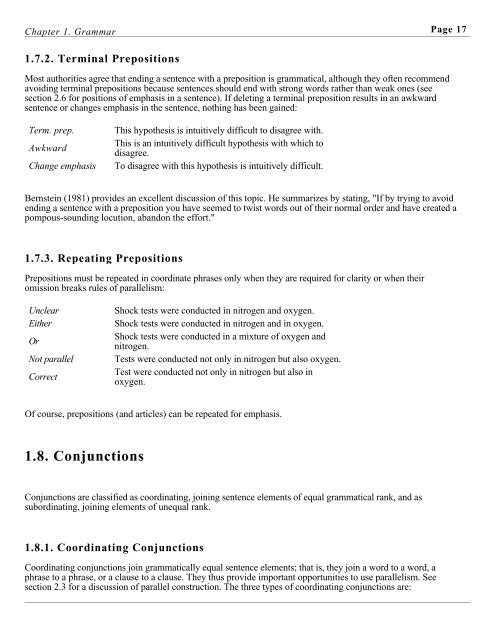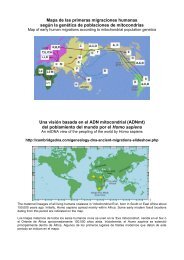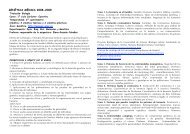Grammar, Punctuation and Capitalization - Handbook for Technical ...
Grammar, Punctuation and Capitalization - Handbook for Technical ...
Grammar, Punctuation and Capitalization - Handbook for Technical ...
Create successful ePaper yourself
Turn your PDF publications into a flip-book with our unique Google optimized e-Paper software.
Chapter 1. <strong>Grammar</strong> Page 171.7.2. Terminal PrepositionsMost authorities agree that ending a sentence with a preposition is grammatical, although they often recommendavoiding terminal prepositions because sentences should end with strong words rather than weak ones (seesection 2.6 <strong>for</strong> positions of emphasis in a sentence). If deleting a terminal preposition results in an awkwardsentence or changes emphasis in the sentence, nothing has been gained:Term. prep.AwkwardChange emphasisThis hypothesis is intuitively difficult to disagree with.This is an intuitively difficult hypothesis with which todisagree.To disagree with this hypothesis is intuitively difficult.Bernstein (1981) provides an excellent discussion of this topic. He summarizes by stating, "If by trying to avoidending a sentence with a preposition you have seemed to twist words out of their normal order <strong>and</strong> have created apompous-sounding locution, ab<strong>and</strong>on the ef<strong>for</strong>t."1.7.3. Repeating PrepositionsPrepositions must be repeated in coordinate phrases only when they are required <strong>for</strong> clarity or when theiromission breaks rules of parallelism:UnclearEitherOrNot parallelCorrectShock tests were conducted in nitrogen <strong>and</strong> oxygen.Shock tests were conducted in nitrogen <strong>and</strong> in oxygen.Shock tests were conducted in a mixture of oxygen <strong>and</strong>nitrogen.Tests were conducted not only in nitrogen but also oxygen.Test were conducted not only in nitrogen but also inoxygen.Of course, prepositions (<strong>and</strong> articles) can be repeated <strong>for</strong> emphasis.1.8. ConjunctionsConjunctions are classified as coordinating, joining sentence elements of equal grammatical rank, <strong>and</strong> assubordinating, joining elements of unequal rank.1.8.1. Coordinating ConjunctionsCoordinating conjunctions join grammatically equal sentence elements; that is, they join a word to a word, aphrase to a phrase, or a clause to a clause. They thus provide important opportunities to use parallelism. Seesection 2.3 <strong>for</strong> a discussion of parallel construction. The three types of coordinating conjunctions are:






